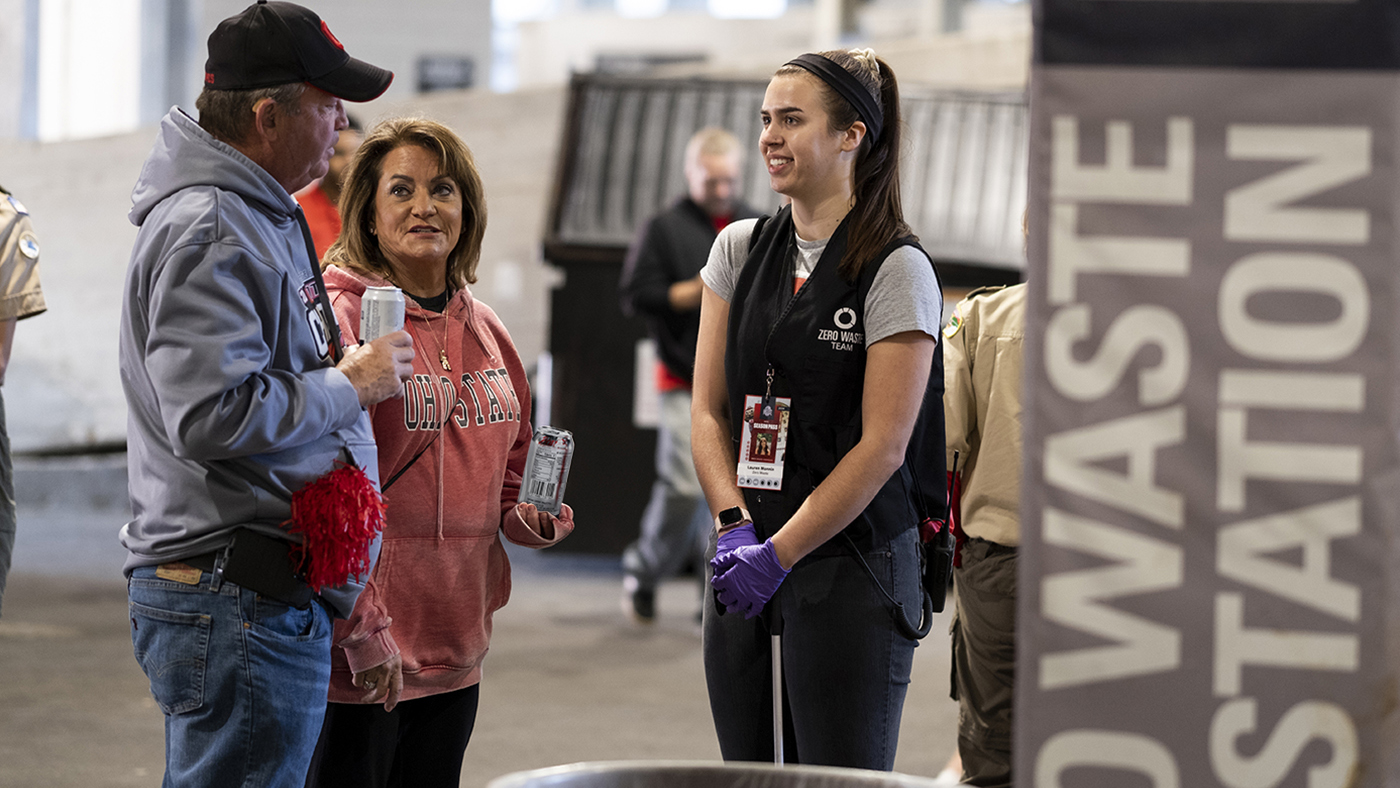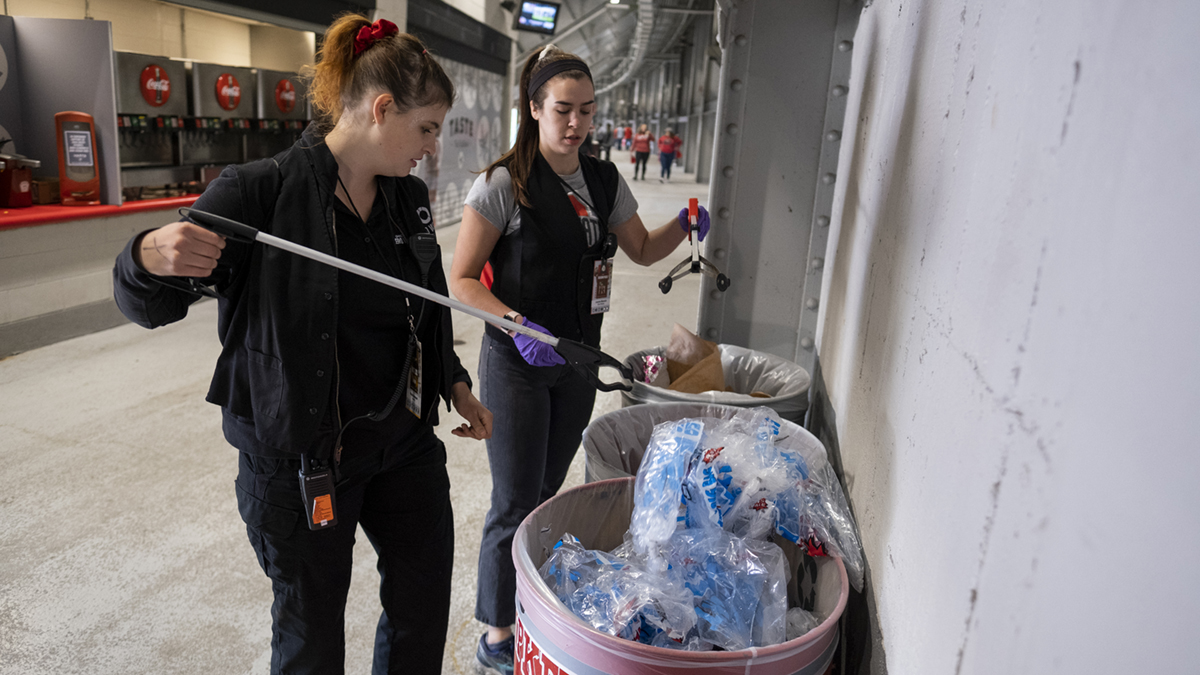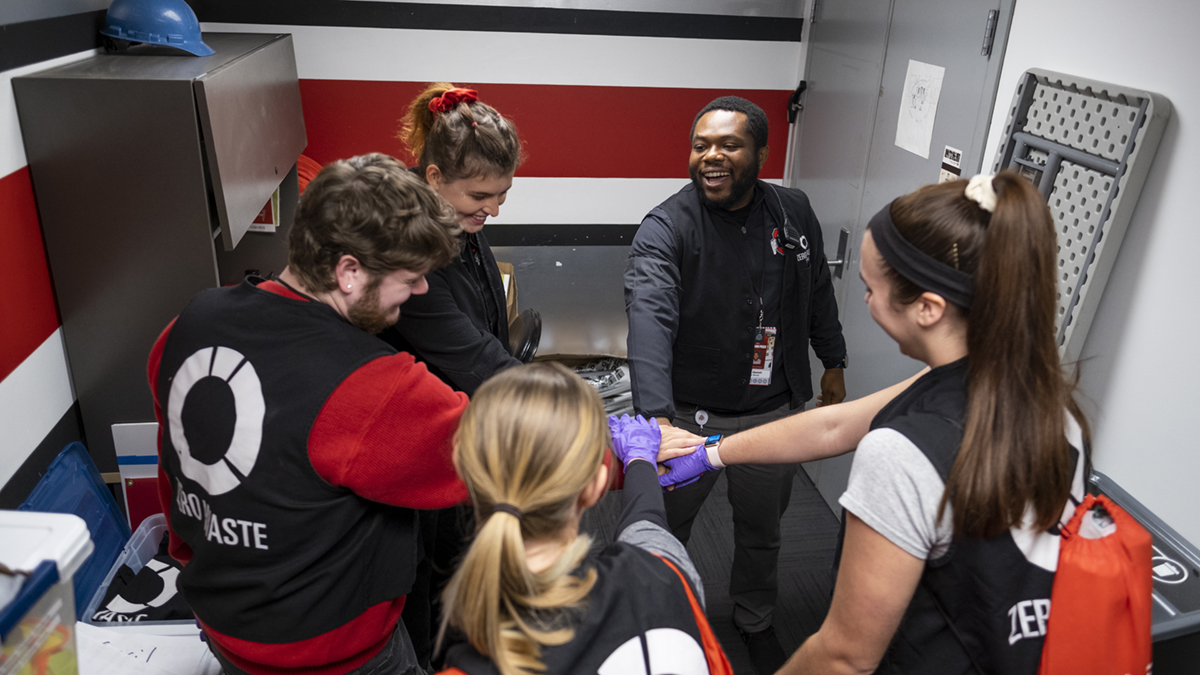Doing what it takes to keep the ’Shoe green
Sustainability means long days, sore feet and a vital Zero Waste initiative at Ohio Stadium

It’s dirty, stinky, often disgusting work. But everyone doing it knows how vital it is.
“It’s walking and walking, feet hurtin’, perseverin’, digging into bags of half-eaten food, the worst stuff in the world, but it’s essential we do it,” says Maya Hammond, a Zero Waste intern who spends her home football games sorting the waste at Ohio Stadium.
Being on the team means spending 10 hours at Ohio Stadium on game days without a single play watched, arriving before anyone else, leaving after everyone else, and helping make sure the stadium is maintaining its zero waste goals – diverting 90 percent or more of waste materials from landfills by recycling and composting.
“It’s long days, it’s hard work, it doesn’t smell good, but it’s a phenomenal experience,” says Cecilia Yeckley, also a Zero Waste intern. “You wouldn’t think digging through trash with someone would be a good bonding experience, but honestly it is.”
Because of the work by Ohio State students like Yeckley and Hammond, along with other staff members and high school volunteers going back to 2011, Ohio Stadium is the largest stadium in the country to continuously achieve zero waste status.
It’s an ambitious feat, considering a typical game day can see 100,000 fans creating up to 30,000 pounds of waste. However, Ohio State has ambitious sustainability goals – such as becoming a zero waste campus by 2025 and achieving carbon neutrality by 2050.
“The ultimate goal is making sure we’re accomplishing what we’ve set out to do, which feeds into what the university is trying to achieve,” says Cecil Okotah ’17, the Stadium Zero Waste program manager. “It’s a flagship program we hope others can emulate in different units on campus.”
About three hours before the game, Okotah’s team of Ohio State student interns and about 35 high school volunteers from the I Am Change Outreach program meet to prepare for game day.
During the game, the team patrols the concourse, talking to fans about what should be recycled or composted. They also decontaminate bins, sorting the waste. The next day, members of the Navy ROTC program clean and decontaminate the inside of the stadium.

All the waste from the game is then sent to be processed at the London Correctional Institution. There, incarcerated adults sort the materials for composting and recycling through Ohio Penal Industries (OPI), which operates under the direction of the Ohio Department of Rehabilitation and Correction (ODRC) and provides work training opportunities and job placement upon release for nearly 1,185 incarcerated adults in 30 operations in 13 prisons throughout the state.
Those in the program are paid minimum wage and receive training, such as heavy equipment operation and composting, for reentry after incarceration.
A few years ago, according to Mary Leciejewski, Zero Waste Manager at Ohio State’s Facilities Operations and Development (FOD) department, Ohio State students raised concerns about the ethical nature of this relationship. That led to an independent review by the University Task Force on Racism & Racial Inequities that found the program to be successful and recommended it continue.
This past summer, Okotah visited the London Correctional Institution to see the operation first-hand.
“The reception has been great by the people doing the work,” he says. “They’re excited to be part of the program and it gives them the opportunity to educate themselves with skills that can aid them with job searches later.”
Why they do it
The Zero Waste internship, according to Okotah, allows participating Ohio State students the chance to gain real-world experience toward their majors, most of which are in the sustainability or environmental science disciplines.
Yeckley, an evolution and ecology major, joined the Zero Waste team not only to contribute to sustainability efforts but to hone her science communications skills by helping educate fans on topics like composting and recycling.
“It shows I don’t mind getting my hands quite literally dirty and I do believe it’s helping me build communication skills,” she says. “As far as reaching zero waste, I was pretty pessimistic going in. I genuinely did not believe we’d produce a viable result, but to actually see how our team comes together is incredible.
“It’s really impressive that every year students and people at Ohio State say, ‘I’m going to tackle this challenge.’ ”
In addition to working at the stadium on game days, Hammond – majoring in the environment, economy, development and sustainability, with a specialization in business and sustainability – is a Zero Waste intern year-round. Hammond helps FOD implement sustainability practices across campus as the university continues to move toward its goal of becoming a zero waste campus by 2025. She says having the support of President Kristina M. Johnson, who taught a class on reducing carbon emissions, is crucial.

“Often the biggest boundary is leadership, so the fact President Johnson supports these efforts is all we can ask for,” Hammond says.
“I’m a big environmentalist because I understand that if I want to do all the things I enjoy, like watch a football game, I need the Earth to have resources to do that. Am I really making a difference? It’s definitely better than nothing. And little by little, as people get familiar with what we’re doing, more people will help. It’s just about persevering and remembering we’re doing all we can.”
Okotah’s support as the team’s mentor is also crucial to the Zero Waste initiative, according to Hammond and Yeckley.
“I am from Ghana and have seen what pollution has done to some of the communities I’m coming from,” says Okotah, who has called Columbus home since 2011. “So, to see Ohio State being a leader in this, to see our community is passionate about being good environmental stewards, gives me joy because ultimately what we do affects people in a positive way.”